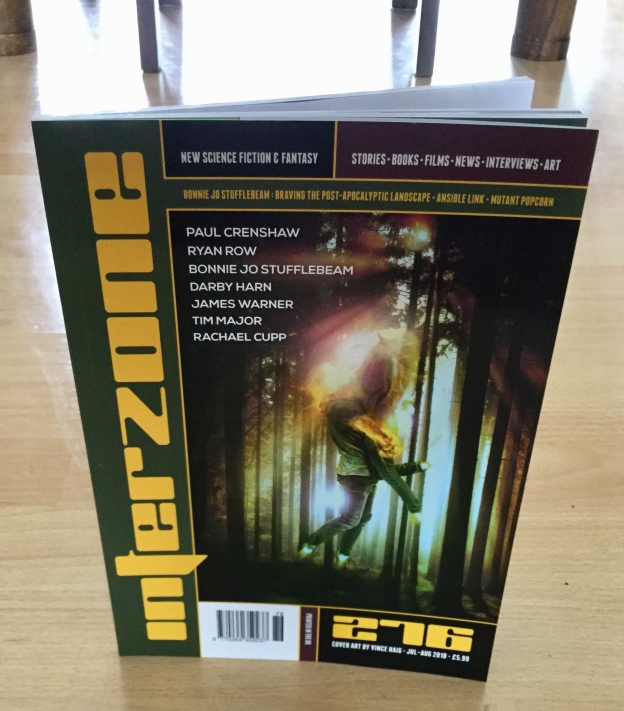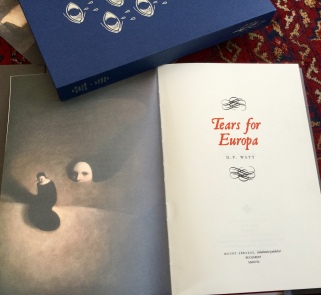Interzone #276

TTA PRESS Jul-Aug 2018
My previous reviews of this publisher HERE.
Stories by Paul Crenshaw, Ryan Row, Bonnie Jo Stufflebeam, Darby Harn, James Warner, Tim Major, Rachael Cupp.
When I read this fiction, my thoughts will appear in the comment stream below…






As you can see, and as I can fully attest, this physical book and accoutrements have reached the highest unmatchable quality standard of Mount Abraxas.
Over 120 pages, my copy numbered 3/177.
IMPERIUM SINE FINE
“You are not aroused, there is nothing erotic between you — rather a return to the innocence of skin upon skin and the nearness of other breaths mingling with your own in a fug of warmth; joined together as one being cradled within the womb of some great invisible mother.”
Possibly the book’s clearest coda possible, clotted, too, as the book’s own theatrical prop, a cosmic jest or serious prose-textured threnody. It is THE book’s temple of thought, almost insentient, almost divine, essentially both insentient and divine through trick, outrageous coincidence, spiritual and/or hedonistic rite of passage, upon belly’s lining or soul’s effulgence. It is its own “chance meeting” with hidden yearnings. It is also my own visit last week to Prinknash Abbey (‘k’ not pronounced), a monastery where my thoughts concerned what might go on within it, where I was not allowed to go. And thinking of Ketelby as I wandered their Monastery Garden. Finzi and Gurney in Gloucester Cathedral. A flooded Holst museum in Cheltenham. The Last Word in Art, Gilbert, George, Hockney, Duchamp et al. Rococo gardens. Mazes and follies and gestalt labyrinths. InkerMen’s Book as Book.
THE book also needs its interleaved quotations, upholstery, upHOLSTery, and artwork taken into account. One review can only go so far.
============================
The next story was first reviewed by me here: https://dflewisreviews.wordpress.com/2016/01/30/the-gift-of-the-kosmos-cometh/#comment-6374 as follows:-
“But Los saw the Female & pitied
He embrac’d her, she wept, she refus’d
In perverse and cruel delight
She fled from his arms, yet he followd”
— William Blake (The Book of Urizen)
‘Tis a Pity She Was A Whore
ARCHONTES ASCENDANT
“…and we are ready to become again.”
Another crafted text that teems with resonant power and the rockstars of a Byronic Darkness, depicting an “ever-proliferating dock shanty” by the city’s river, where the narrator, instead of tough and evil as this place requires, suffers the ‘disease’ of using the words ‘friend’ and ‘happy’, but after befriending a suffering whore, an ostensibly different female figure leads him instead to a hardening epiphany…an eponymy once named Uriel.
This is a remarkable work in the sense that it leads us astray, with a soul seemingly beyond the control of its narrator and freehold author that lets us down with a downrush of despair, where before we had expected the author to ensure that the narrator spread his goodness beyond himself in this evil land, as if we are made to read to the end, by some perverse imp, an imp that makes some sense, for the first time, in my experience, of the maxim that “the road to Hell is paved with good intentions.” The narrator and his brother, too. Even the Villa of Ormen?
“That ominous night brought me dreams of stars — yes, Stars!”
cf Pity the Whore, from Blackstar album!
“, a time of restless exhaustion, rather like an unbearable summer, where one is too hot and drained to sleep, and labour in vain for some respite from the unremitting heat and discomfort.”
Reading and reviewing this work this morning, is one such labour on my part during real-time’s unremitting heat, that seems to have lasted forever and still intends to do so. Itself a strong and powerful Proclamation this work about itself? I feel everyone will recognise it around themselves, hearing it perhaps for the first time knowing others are hearing it, too. The ‘end times’ confirmed and thus faced? Or a dread that the Proclamation about itself is worthless, because we hear beyond it!
Silence or our own screaming that the silence reveals?
Essential Wattage.
“It is difficult to remove a wall without unearthing the remains of those interred for whatever reason, by whatever ruler.”
By grog and bacca, ‘Autothysis’ is a sister word of ‘Dehiscence’, and here we have a specially nurtured narrative representative (“my cracked hands at a fat bosom”), a representative of the kept-down masses speaking to us — via the powerful, highly honed, muscular-poetic style of the freehold author — about the way Great Rulers are created to keep those masses down In a fragile-brittle order, created and then spectacularly and theatrically destroyed by autothysis as part of that very counterintuitive or Machiavellian creation. Another Proclamation, as an ever-possible Lottery or Zeno’s Paradox Tontine, for our times, I say.
“The sad sun’s face gave to the frightened world a livid light; and in the night-time torches seemed to burn amid the stars, and often drops of blood fell in rain-showers. Then Lucifer shone blue with all his visage stained by darksome rust.” OVID, Metamorphoses, XV
This story’s title – with headquote (above) – is perfectly in tune with last night’s breaking of many weeks of hot, dry, naked sun, with a thunderstorm and lightning, a storm that hid the Blood Moon and Red Mars we were otherwise meant to see, and now this morning my lawn is still ‘ darksome rust’, yet just enough blue in the cloudy sky to make a sailor-man’s tunic (or to make a Devil’s cravat). A sky otherwise with milky mist encroaching on the sight….
And OVID is a VOID by another twist of life’s sickness, here depicted year by year by a narrator, who meets old friends from time to time, but gradually an attritional path downward, via dandelions (dandelions featured significantly in my reviews yesterday but I forget and can’t be bothered to check exactly where); I feel like this narrator and wonder how much longer before my own final lonely howl sounds out. But, in many ways, the style of this paean to despair by Watt is so tantalisingly and phenomenologically couched, it serves to bolster my spirits by just plain admiration of what I have been reading. Possibly the most effectively depressing passages ever written.
“Beat. Beat. Beat.”
Incantatory recitations adressed to you as a member of ‘we’, a series of ‘Do you remember…” prose paragraphs, as a poetic-cosmic Gaia in gestalt entropy.
“O Theotormon! robb’d of joy, I see thy salt tears flow.”
From William Blake’s EUROPE: A PROPHECY
Even just one quote from this, will risk unravelling it. A series of meticulous and painstaking options as to secret making or secret keeping. In or out of mind or spirit, secrets are often autonomous creatures it seems, and this exhaustive essay has puckish, poetic prose of the highest order. It is rather special in the canons of literature, I suggest, with at least one secret ingredient that only readers of this book will find being made in it – a secret that needs to be kept in the best way possible for each reader.
“, for a day; a day”
You once lived a day a day to put life in. But, now, to extract it.
I would need to quote the whole text of this most tactilely and emotionally powerful dystopic vision of the containing book’s title and its gloriously rough redness of inner cover to even scratch the surface of its effect on the reader, scratch or brutally tear it with its own built-in claws. The question is whether hope resides in its last five words or even more despair.
=================================
If Brexit happens, we shall be required to hang famous European paintings upside down. (A quote from a review a few weeks ago.)
Now for what was found in the Ballet Case…
THE ENGLISH HOUSE
“, like I was in a cupboard while Europe falls apart…”
In some ways, a post-Brexit SF story depicting the foul and fell repercussions some 30 years hence, without using the word Brexit at all.
In another way, an extension of this book’s nostalgia gent-to-gent over cordial whisky factored into by the thwarted ambitions of Hughes in the form of a recurrent Zeno’s Paradox, the haunting of them like the past wars in Holman, then Insole’s cross-sections of war and Meaulnes-type literature and Fern Hill or H.E. Bates type gaia, growing into more of this book’s nagging or sometimes gossamer gestalt.
But in essence, this is a work-on-its-own, a mesmerising tryst with the oblique power of fantasy that is generously dream-like or Sarban-like, even Blakean or Carcosan (a King in a yellow robe) so as to conjure the past and the future’s attempts to transcend it. Despite the strictures of historic Brexit, Englishman Michael lives in Dinan, in a house overlooking the mysterious, seemingly untenanted, ironically-named Maison Anglaise, a vaguely perceived house that seems to haunt him (following the telling departure of his visiting, whisky-sharing old friend David), and somehow, based on the evidence of the diary in his daughter’s Ballet Case, haunting her with its lasting, literally long-standing visions, and his wife, too. It will be hard to forget this moving and gradually grasping work. We shall all need to stand and wait.
————————-
“In the pebbles of the holy streams.”
Fern Hill, Dylan Thomas
Soot
.“They were all marching around and around the ring, each of them slowly becoming a little more animal-like with each step of the march.”
about the Head Circus in ‘Roll Up! Roll Up! Europa!’ first published in 2014.
Roll up, Europa, indeed.
My photographs as shown below relate to this work SOOT in INFRA NOIR and the words below are in the context of my 2014 review of this Mount Abraxas publisher’s utterly wonderful book with that unique overall title: https://dflewisreviews.wordpress.com/2014/08/01/infra-noir/
soot by dan watt and andrzej welminski
“The room was thick with cigar smoke.”
This work is generously artworked – an exorcism by adoption of all that had been earlier cleaned from the hotel walls in the previous story? Actually, it is, for me, a delightfully old-fashioned Avant Garde theme and variations, with prose and washed drawings, depicting “It was a time of macabre, and maniacally mystical transformation.”
WHEN I WAS DEAD
“I am a ghost. I do not haunt.”
A very moving refrain of “when I was dead’ in rhapsodic prose passages, a refrain to die for. A refrain, I judge, spoken by Europa herself whom we all once loved amid the poppy fields. A refrain of cruel ritual and regret with dreams of reversal as a “relic of a hope.” Will we remember Europa, other than hidden in obscure books, I ask?
The back cover of The Ha of Ha (2011)
end